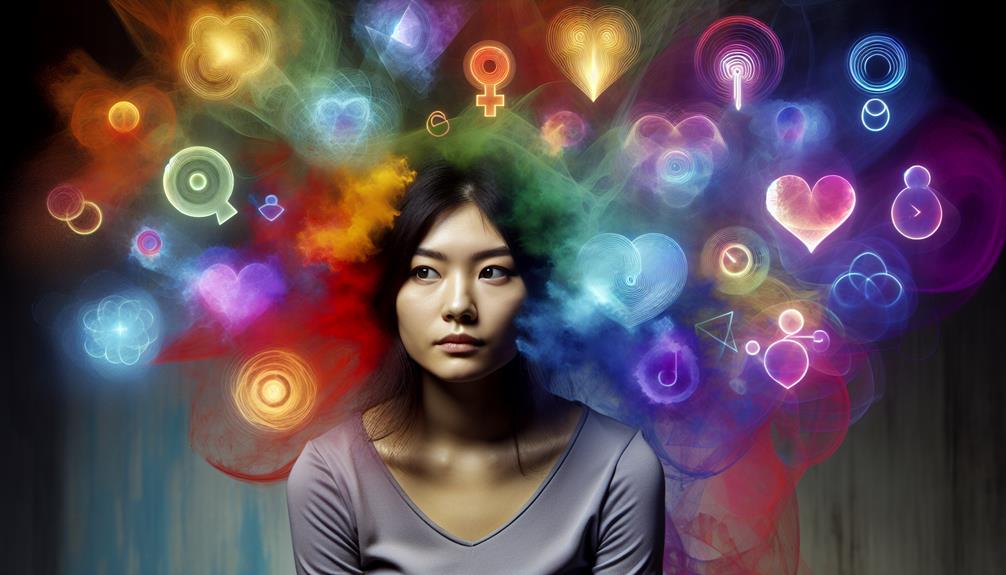Exploring the intricate facets of human desire through the lens of erotic fantasies unveils a complex interplay of psychological processes.
From the subconscious whispers of childhood memories to the societal constructs that shape our perceptions, the tapestry of our desires is woven with threads of intricate nuances.
Unraveling the mysteries that underpin our most intimate yearnings requires a nuanced understanding of the psyche, where the shadows of taboo and the allure of the forbidden dance in a delicate balance.
Understanding the psychology of desire offers a glimpse into the depths of human complexity that often defy conventional explanations.
Key Takeaways
- Imagination intensifies desires and enhances intimate experiences.
- Forbidden desires, like incest and BDSM, are explored to understand and accept them.
- Childhood experiences shape erotic preferences and fantasies.
- Gender influences the themes and dynamics of erotic fantasies.
The Power of Imagination in Desire
The role of imagination in shaping and intensifying desires is paramount in understanding the complexities of human sexuality. Imagination acts as a powerful tool that can stimulate arousal and enhance one's intimate experiences. Through the creation of erotic fantasies, individuals can explore their deepest desires and unearth hidden aspects of their sexuality. This process allows for a safe space to experiment with different scenarios, roles, and sensations that may not be feasible in reality.
Imagination plays a crucial role in fueling desire by tapping into the subconscious mind and unlocking fantasies that are often suppressed or overlooked. It enables individuals to break free from societal norms and expectations, allowing for a more authentic and fulfilling sexual expression. By embracing and exploring the depths of their imagination, individuals can cultivate a greater sense of self-awareness and acceptance of their desires.
In essence, the power of imagination in desire serves as a gateway to self-discovery and personal liberation within the realm of human sexuality. Embracing one's fantasies and allowing imagination to flourish can lead to a more profound connection with oneself and others, fostering a sense of belonging and acceptance in the diverse tapestry of human desires.
Unveiling Taboos and Forbidden Desires
Exploring the depths of human sexuality involves confronting societal taboos and acknowledging the existence of forbidden desires that often linger beneath the surface of conscious awareness. In understanding erotic fantasies, it is crucial to recognize that individuals may harbor secret desires that society deems unacceptable. These forbidden desires can range from taboo sexual acts to unconventional fetishes, and they play a significant role in shaping an individual's innermost fantasies.
To provide a clearer understanding, the table below outlines some common taboos and forbidden desires:
| Taboos | Forbidden Desires |
|---|---|
| Incest | BDSM |
| Exhibitionism | Voyeurism |
| Age Play | Sadomasochism |
| Bestiality | Role-playing |
| Necrophilia | Water sports |
Acknowledging and exploring these forbidden desires can lead to a deeper understanding of one's own sexuality and preferences. It is essential to approach these topics with an open mind and a non-judgmental attitude to foster a sense of belonging and acceptance within oneself.
Influence of Childhood and Past Experiences
Understanding how childhood and past experiences shape an individual's erotic desires is essential in unraveling the complexities of human sexuality. Early interactions with caregivers, exposure to certain stimuli, and experiences of pleasure or trauma can all leave lasting imprints on one's sexual preferences and fantasies.
For instance, a person who experienced feelings of shame or guilt around sexuality during childhood may develop fantasies that involve elements of secrecy or taboo. On the other hand, positive and affirming experiences in early relationships can lead to a preference for intimacy and connection in erotic fantasies.
Additionally, cultural attitudes and societal norms absorbed during formative years can influence the types of scenarios that appear in one's erotic imagination. By exploring the influence of childhood and past experiences on erotic desires, individuals can gain insight into the roots of their fantasies and better understand their unique sexual selves. This self-awareness can foster a sense of belonging and acceptance within one's sexual identity.
Social Constructs and Erotic Fantasies
Social constructs play a significant role in shaping the intricacies of individuals' erotic fantasies, reflecting the societal norms and values that influence the depths of human desire. These constructs can mold fantasies in various ways, such as:
- Cultural Influences: Cultural norms and traditions can dictate what is considered taboo or acceptable, impacting the themes and scenarios that feature in erotic fantasies.
- Media Portrayals: The media, including movies, books, and online content, can shape individuals' fantasies by presenting certain behaviors or relationships as desirable or attractive.
- Peer Interactions: Interactions with peers and social circles can also influence erotic fantasies by introducing new ideas, experiences, or perspectives that individuals may incorporate into their own desires.
The Role of Gender in Fantasies
Gender plays a fundamental role in shaping individuals' erotic fantasies, influencing the themes, dynamics, and characters that feature prominently in their imaginative desires. Cultural norms, personal experiences, and societal expectations all contribute to the construction of these fantasies. In exploring the role of gender in fantasies, it's essential to recognize the diverse ways in which individuals perceive and express their desires based on their gender identity.
| Male Fantasies | Female Fantasies | Non-Binary Fantasies |
|---|---|---|
| Power Dynamics | Emotional Connection | Fluidity |
| Multiple Partners | Sensory Experiences | Androgyny |
| Dominance/Submission | Romance | Gender-Neutral |
| Fetishization | Role-playing | Transformation |
| Voyeurism | Slow Build-Up | Exploration |
Understanding the role of gender in fantasies can provide insight into the complexities of human desire, highlighting the significance of personal identity and societal influences in shaping these intimate thoughts. By acknowledging and exploring the diversity of erotic fantasies across different gender identities, individuals can find a sense of belonging and validation in their unique desires.
Frequently Asked Questions
Can Erotic Fantasies Ever Be Considered Harmful or Problematic?
Erotic fantasies can potentially be harmful or problematic if they lead to negative consequences such as interfering with daily functioning, causing distress in relationships, or promoting unhealthy behaviors.
While fantasies themselves are a normal part of human sexuality, it is essential to assess their impact on an individual's well-being and relationships.
Seeking professional guidance and understanding personal boundaries can help navigate the fine line between healthy and harmful erotic fantasies.
How Do Cultural Differences Impact the Content of Erotic Fantasies?
Cultural differences significantly influence the content of erotic fantasies, shaping desires and perceptions of intimacy. These variations can be seen in the themes, settings, and dynamics that individuals find arousing.
For example, while some cultures may emphasize modesty and restraint in sexual expression, others celebrate sensuality and exploration. Understanding these cultural nuances is vital in appreciating the diversity of human sexuality and promoting inclusivity in discussions surrounding erotic fantasies.
Are There Any Ethical Considerations to Keep in Mind When Exploring Erotic Fantasies?
When exploring erotic fantasies, it is crucial to consider ethical considerations. Respect for consent, boundaries, and the well-being of all parties involved should be paramount.
Understanding the potential impact on oneself and others, as well as maintaining confidentiality, are also important aspects to bear in mind.
Additionally, being aware of power dynamics, cultural sensitivities, and legal implications can contribute to a safe and respectful exploration of erotic fantasies.
Can Individuals in Committed Relationships Safely Share Their Erotic Fantasies With Their Partners?
Navigating the delicate realm of sharing erotic fantasies in committed relationships requires open communication and mutual respect. Partners who cultivate a safe space for vulnerability and understanding can find that sharing fantasies can deepen intimacy and strengthen their bond.
However, it is crucial to approach this topic with sensitivity, acknowledging each other's boundaries and comfort levels. Trust and empathy play pivotal roles in ensuring that sharing fantasies enhances rather than strains the relationship.
How Do Mental Health Conditions, Such as Anxiety or Depression, Influence the Nature of Erotic Fantasies?
Mental health conditions like anxiety or depression can significantly impact the nature of erotic fantasies. Research suggests that individuals experiencing these conditions may have altered perceptions of intimacy, self-worth, and pleasure, leading to a potential shift in their fantasies towards themes that reflect their emotional struggles.
Understanding how mental health influences erotic fantasies is crucial in providing appropriate support and therapy to address underlying issues and promote overall well-being.
Conclusion
In exploring the psychology of desire and erotic fantasies, we uncover the intricate web of our subconscious thoughts and past experiences.
Like a complex tapestry woven from threads of imagination and societal norms, our fantasies reveal hidden desires and taboos.
By understanding the roots of our desires, we can navigate the intricate landscape of our minds and embrace the complexity of human sexuality.

